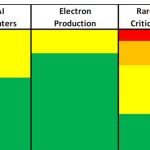Authored by MN Gordon via EconomicPrism.com,
“And cast ye the unprofitable servant into outer darkness: there shall be weeping and gnashing of teeth.”
– Matthew 25:30
Daycare for Adults
Sometimes things must get worse before they get better. Reducing deficit spending and eliminating government waste, for example, will initially have a negative impact on GDP and employment. Though, this is exactly what is needed to restore America’s economic health.
U.S. government spending has run riot for over 50 years. Over the last two decades, it has gone completely berserk. In fact, since 2004, the national debt has jumped from $8 trillion to $36 trillion.
All this debt-based government spending has created massive distortions in the economy. The price of consumer goods, a glut of unproductive government jobs, the appearance of economic growth, and more. The effects of government spending range far and wide.
Without question, government spending is responsible for the inflation of consumer prices. However, it is also responsible for the inflation of key government statistics. Specifically, GDP and employment.
In 2023, nearly 25 percent of all job additions were government jobs. And over the last 12 months, government jobs increased by an average of 43,000 per month. In addition, according to the latest GDP figure, government spending accounted for 30 percent of the annualized growth.
Should Elon Musk and Vivek Ramaswamy make good on their intentions to hit the delete button on numerous federal agencies and eliminate $2 trillion in government spending, two notable things will happen. GDP will topple over and the unemployment rate will skyrocket.
Nonetheless, if you care about America’s long term financial and economic health, this is the best thing that can happen. Jobs that are nothing more than daycare for adults shouldn’t exist.
Egg Hunts
Statistics like GDP and employment can be misleading if you don’t consider what goes into them. Are they the aggregate of real economic activity or are they composed of something phony?
In short, when GDP and employment statistics are inflated by reckless fiscal policies, they stop being measurements of economic health and become barometers of self-destruction.
How did we get here?
The fall from grace can be traced to several sources. The passage of the federal income tax and the creation of the Federal reserve, both in 1913, are certainly part of the genesis.
However, the rationale for using deficit spending to boost GDP and employment was triggered by the 1936 publication of John Maynard Keynes’ The General Theory of Employment, Interest and Money.
Not only is the book rigorously indecipherable. It also has the ill-effect of making those who read it dumber. Unfortunately, Keynes’ drivel became the standard for reckless economic thinking, which still drives economic policy to this day.
Many politicians and establishment economists remain enamored with Keynes’ gibberish. They love that it provides an academic rationale for governments to do what they love to do most – borrow money and spend it on ridiculous programs. Central planners also love that it gives them an economic basis for carrying out their absurd designs.
For example, Keynes advocated filling bottles with money and burying them in coal mines for people to dig up as a way to end unemployment. According to Keynes, this would provide jobs and money for the unemployed. Somehow, these public works egg hunts would create an economic boom and make everyone rich.
Alien Invasions
Over the years this reasoning has inspired countless government stunts to save the economy from itself. The American Recovery and Reinvestment Act of 2009 and the American Rescue Plan of 2021 are two mega Keynesian inspired spending bills passed this century. The U.S. will never be able to overcome the consequences of these asinine programs.
In practice, the execution of Keynesian inspired spending programs never live up to their promises of economic vitality. Debt ends up outpacing GDP growth by leaps and bounds.
In 1980, federal debt was about $1 trillion while GDP was $2.8 trillion. Today, federal debt is over $36 trillion while GDP is around $29 trillion. Thus, over the last 44 years GDP has increased by a factor of 10 while federal debt has increased by a factor of 36.
With this track record of economic growth significantly lagging the growth of government debt, any justification for using deficit spending as a means to grow the economy out of debt is absolute nonsense. Still, Nobel Prize winning economists are fully committed to chasing Keynesian economics to insanity.
Just over a decade ago, Keynes devotee, Paul Krugman, took the logic of Keynesian economics and ran with it to the outer limits of deep space. In the process, he lost his mind.
Following his righteous departure from planet earth, Krugman went on cable television and explained that the proper way to propel an economic growth chart up and to the right is to borrow massive amounts of money and spend it preparing for an alien invasion.
The Choice
Absurd fiscal policies over many decades have created an economy, and hundreds of thousands of employees, that are largely dependent on government spending. This is the economy that President-elect Trump is inheriting when he comes into office.
He is up against an unworkable task. He must address a mega debt crisis that’s partly of his own making. The last time Trump was President the national debt increased by $8 trillion.
At this point, the only way to fix the economy and America’s finances is to first burn them to the ground. The distortions accumulated over many decades are too great. They cannot be undone without first making things worse.
Many years ago, Ludwig von Mises, in Human Action, presented the unpleasant choice team Trump must make.
“There is no means of avoiding the final collapse of a boom brought about by credit expansion. The alternative is only whether the crisis should come sooner as the result of a voluntary abandonment of further credit expansion, or later as a final and total catastrophe of the currency system involved.”
What Musk and Ramaswamy are advocating as part of their Department of Government Efficiency (DOGE) is the alternative of the crisis coming “sooner as the result of a voluntary abandonment of further credit expansion.” The crisis, to be clear, is a deep recession or depression.
It is the right choice, given the poor state of Washington’s finances. But is it already too late to avoid a total catastrophe of the dollar?
There is no way to know for sure. What is known is this:
The mass culling of federal workers. The abrupt eradication of deficit spending. The collapse of GDP and the rise in unemployment. These things are needed to return the USA to a place of good health.
Yet the interim period, which may last for a generation or two, will be of much weeping and gnashing of teeth.
Loading…











